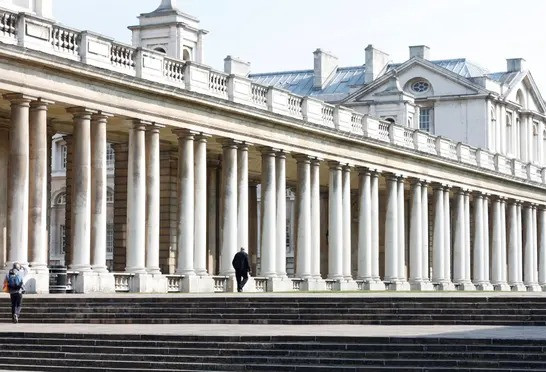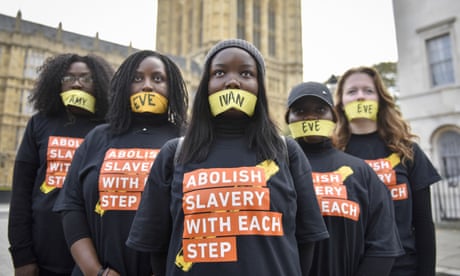Universities have been urged to be on high alert for human trafficking after suspected victims brought to Britain on student visas vanished from their courses and were found working in exploitative conditions hundreds of miles away.
In a recent case, Indian students at Greenwich, Chester and Teesside universities stopped attending lectures shortly after arriving in the UK, according to a report by the Gangmasters and Labour Abuse Authority (GLAA) seen by the Observer.
They were later found in the care sector in Wales, where they were living in squalid conditions with up to 12 people to a three-bed flat, and were working “up to 80 hours a week, sometimes double-shifting”, for “way below” minimum wage.
“[The students’] attendance at university was low or nonexistent and in some cases other persons were logging on for them at lectures to give the impression they were in attendance,” the report said.
It comes after an Observer investigation uncovered widespread labour exploitation in care homes across Britain, with workers from India, the Philippines and countries in Africa found to have been , and in some cases forced to work in conditions akin to debt bondage to repay money owed, with their wages intercepted and passports withheld.
In those cases, many of the suspected victims had come to Britain on legitimate skilled worker visas brought in by the Home Office to
The new evidence sheds light on other routes being exploited by traffickers and rogue agents in response to increased demand for cheap workers amid a worsening UK labour shortage.
In the case identified by the GLAA, the workers are understood to have had just 16 hours of online training and in most cases had not undergone criminal background checks, raising concerns about potential risks to elderly and disabled residents. The care homes that hired them were reportedly unaware of their backgrounds because false information was provided to them by the suspected exploiters, who ran a staff agency.
In another case, students were found living in a property in Birmingham where they had had their passports confiscated and were forced to work in exploitative conditions, according to Unseen UK, which runs a modern slavery helpline.
The students, who also came from India and reportedly spoke little English, were allegedly forced to work 24-hour shifts without breaks and paid so little that they could not afford to eat, according to the charity. The case was referred to police.
Meri Åhlberg, research manager at Focus on Labour Exploitation, said abuse of people on student visas was a growing concern in Britain because of labour shortages. “There have been students who’ve been pressured to work in ways that do not comply with their visa and that makes them really vulnerable to exploitation because they can be told by their employer that they’re going to be reported to immigration enforcement or lose their right to be in the country,” she said.
The findings have led to calls for increased monitoring of student visas and warnings for universities to be on alert, with the GLAA saying they should monitor student applications, attendance and payment of fees to identify signs of modern slavery.
The University of Nottingham Rights Lab, the world’s largest group of modern slavery researchers, has also described international student recruitment as an area of high risk at British universities. and warned in a recent report on campuses that student visas could be used to facilitate human trafficking.
Despite the increased risks, it said there was limited recognition of vulnerable students, with only 7.7% of universities it examined providing specific training to staff in pastoral roles. It has drawn up a blueprint to help universities tackle modern slavery, with recommendations including improved staff training and dedicated working groups.
International students are a key source of income for universities, with an estimated 605,130 in the UK in 2020-21, according to the Higher Education Statistics Agency – with three-quarters of them coming from outside the EU. The Institute for Fiscal Studies estimates that fees from international students make up about 17% of the total income of the sector.
Universities with a licence can sponsor students to come to the UK provided they have an offer of a place on a course, with applicants generally required to have enough money to support themselves and cover their fees and good English language skills. After they arrive in the UK, the university sponsoring them is required to monitor their attendance, engagement and absences.
Universities UK, which represents 140 universities, said there were very low levels of abuse in the student system and that many of its members “go beyond what is formally required by the Home Office” to prevent students being exploited. Extra steps it recommends universities take to prevent abuses include introducing pre-application screening calls to ensure the credibility of applicants and increased deposit requirements.
Teesside University said it took a “rigorous approach” to the safety and welfare of students. Attendance was monitored and there were channels for students to seek support.
A recent compliance inspection from the Home Office, which involved a Higher Education Assurance Team Audit, resulted in the university’s processes being deemed compliant with the necessary standards, a spokesman said. Chester and Greenwich universities were contacted for comment.
The Home Office said: “Criminals who force people into modern slavery for commercial gain will be tracked down and brought to justice. We have given law enforcement bodies the powers and resources to take action where exploitation is found.… as you’re joining us today from the Netherlands, we have a small favour to ask. Tens of millions have placed their trust in the Guardian’s fearless journalism since we started publishing 200 years ago, turning to us in moments of crisis, uncertainty, solidarity and hope. More than 1.5 million supporters, from 180 countries, now power us financially – keeping us open to all, and fiercely independent.
Unlike many others, the Guardian has no shareholders and no billionaire owner. Just the determination and passion to deliver high-impact global reporting, always free from commercial or political influence. Reporting like this is vital for democracy, for fairness and to demand better from the powerful.And we provide all this for free, for everyone to read. We do this because we believe in information equality. Greater numbers of people can keep track of the events shaping our world, understand their impact on people and communities, and become inspired to take meaningful action. Millions can benefit from open access to quality, truthful news, regardless of their ability to pay for it.Every contribution, however big or small, powers our journalism and sustains our future. Support the Guardian from as little as €1 – it only takes a minute. If you can, please consider supporting us with a regular amount each month. Thank you.

